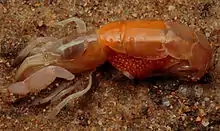Trypaea
Trypaea australiensis, known as the (marine) yabby or ghost nipper in Australia, or as the one-arm bandit due to their occasional abnormally large arm,[1] and as the Australian ghost shrimp elsewhere,[2] is a common species of mud shrimp in south-eastern Australia,[2] and may be the only extant species in the genus Trypaea.[3][4] T. australiensis is a popular bait used live or frozen by Australians targeting a range of species.[5] It grows to a length of 6 centimetres (2.4 in) and lives in burrows in mudflats or sandbanks, especially in or near estuaries.[6]
| Trypaea australiensis | |
|---|---|
 | |
| Trypaea australiensis | |
| Scientific classification | |
| Domain: | Eukaryota |
| Kingdom: | Animalia |
| Phylum: | Arthropoda |
| Class: | Malacostraca |
| Order: | Decapoda |
| Suborder: | Pleocyemata |
| Family: | Callianassidae |
| Subfamily: | Callianassinae |
| Genus: | Trypaea Dana, 1852 |
| Species: | T. australiensis |
| Binomial name | |
| Trypaea australiensis Dana, 1852 | |
Species
One extant and two extinct species belong to the genus Trypaea:[7]
- Trypaea australiensis Dana, 1852 (Australian ghost shrimp) (Indo-West Pacific and Australia)
- † Trypaea inornata (Nagao & Huzioka, 1938)
- † Trypaea mizunamiensis Karasawa, 1993 (temperate Asia)
References
- "Fishnet | Library". Archived from the original on 8 May 2016. Retrieved 17 April 2016.
- "Species Trypaea australiensis Dana, 1852". Australian Faunal Directory. Department of the Environment, Water, Heritage and the Arts. 3 June 2010. Retrieved 6 July 2011.
- "Trypaea Dana, 1852". Integrated Taxonomic Information System. Retrieved 6 July 2011.
- Gary Poore (2010). "Trypaea Dana, 1852". World Register of Marine Species. Retrieved 6 July 2011.
- K. Rowling, A. Hegarty & M. Ives, ed. (2010). "Ghost nipper (Trypaea australiensis)". Status of Fisheries Resources in NSW 2008/09 (PDF). Cronulla: NSW Industry & Investment. pp. 143–144.
- "Trypaea australiensis Dana, 1852, Australian ghost shrimp". SeaLifeBase. 23 March 2010. Retrieved 6 July 2011.
- "WoRMS taxon details, Trypaea Dana, 1852". World Register of Marine Species. Retrieved 3 September 2023.
This article is issued from Wikipedia. The text is licensed under Creative Commons - Attribution - Sharealike. Additional terms may apply for the media files.